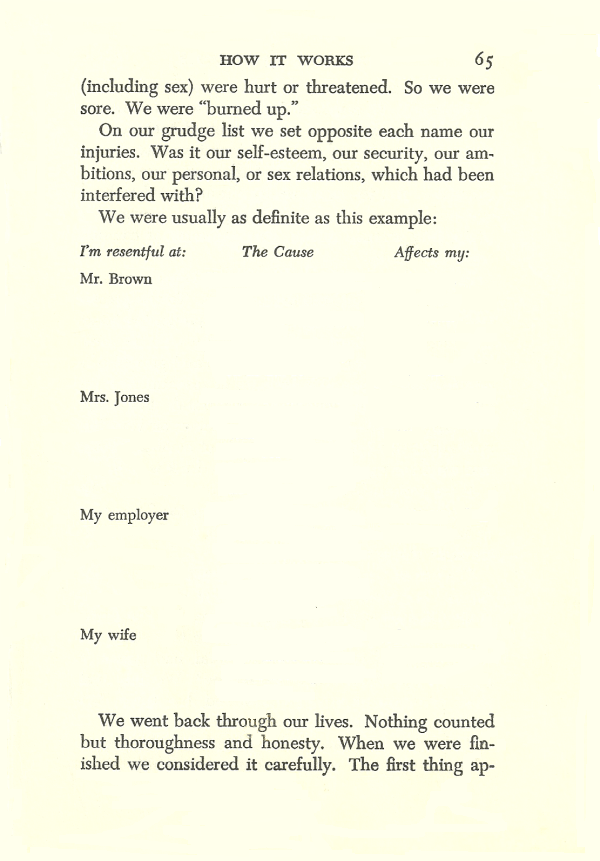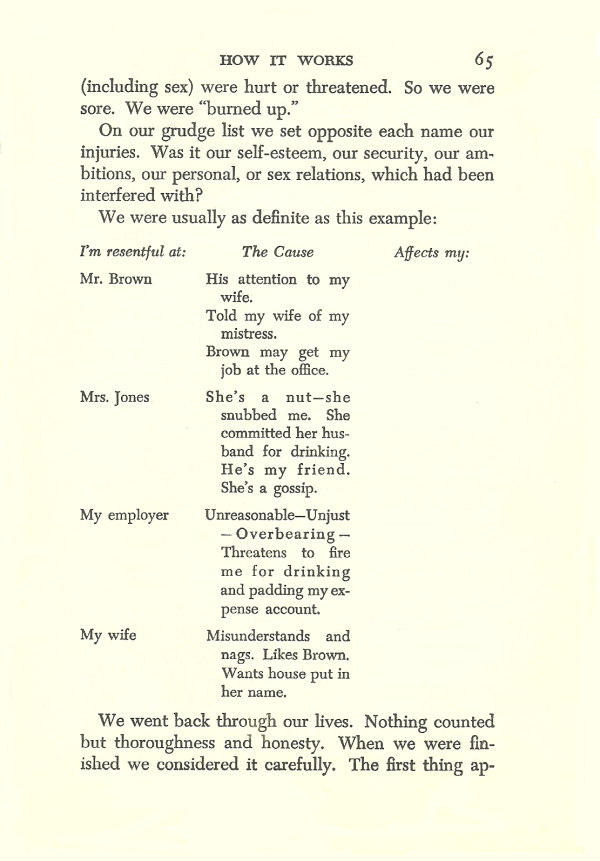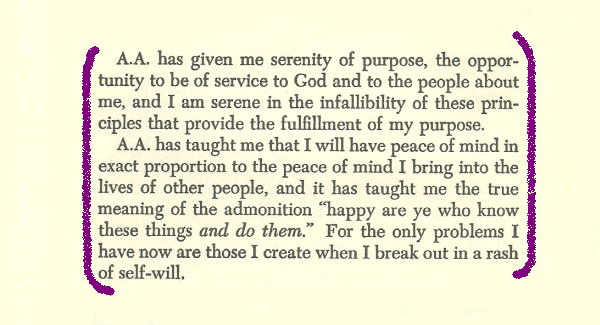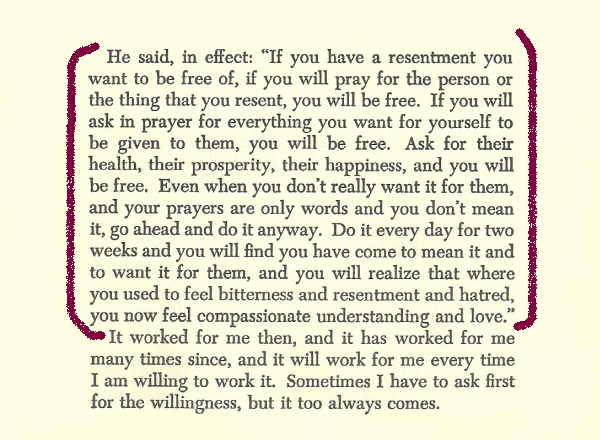“We admitted we were powerless over alcohol –
– that our lives had become unmanageable.”
(“Alcoholics Anonymous“, page 59)
You might have already heard all kinds of things about Step One, and you might even have some thoughts, opinions or experiences of your own here. Either way is fine, of course, but if you have a desire to stop drinking and you have yet to be able to do that “for good and all”, as Dr. Bob would say, we are here because we have been there and we can show you what we have since done to permanently recover from chronic alcoholism. Just as for us, and as evidenced in this following excerpt from our book, it is a fact that the chronic part of anyone’s alcoholism actually can be removed for people such as ourselves who will never be able to drink safely…
“We are (no longer) fighting it, neither are we avoiding temptation…
We have not even sworn off. Instead, the problem has been removed.” (page 85)
So, let us begin at the beginning, Step One…and yes, we will definitely be keeping things simple!
“Alcoholism, as we understand it” (page 28), is a two-fold “condition” or “state of mind and body”:
“…a seemingly hopeless state of mind and body.” (Foreword to First Edition)
“…a hopeless condition of mind and body.” (page 20)
We have heard alcoholism described as a three-fold, four-fold or even a five-fold disease, illness or malady, and we have heard it described as being like an onion with innumerable layers to be stripped away before we might ever get to its core or expose its root or whatever. A.A. takes a much different approach at Step One:
“(a) We were alcoholic and could not manage our own lives.
“(b) No human power could have relieved our alcoholism.” (page 60)
Beginning on page 30 in our A.A. “Big Book”, let us look more closely at the physical part of our alcoholism…
“Most of us have been unwilling to admit we were real alcoholics.
No person likes to think he is bodily and mentally different from his fellows.
…countless vain attempts (trying) to prove we could drink like other people.”
We are not telling you about you, we are telling you about ourselves…and we do that while hoping our doing so might help you easily see and decide the matter of alcoholism for yourself. Some of your drinking experiences might convince someone else you are alcoholic…but it was our own convictions about ourselves that finally helped make the difference for us. The same will be true for you, we believe, so consider this about people like ourselves…
a) We had lost all control over alcohol while drinking;
b) We had been equally powerless to remain abstinent after stopping.
Or in different words:
First the alcoholic take a drink –
then the drink takes a drink
– then drink takes the alcoholic.
Do you have that “physical allergy” part of alcoholism? Some of us, but not all, once had complete control over how much we drank whenever we drank. Over time, however, we each ultimately discovered alcohol had somehow “taken over” and seemed to be demanding more of itself every time we drank…and we have since concluded that is exactly what had been going on. As shared elsewhere in our book of “combined experience and knowledge” (page 19):
“…once s/he takes any alcohol whatever into his/her system, something happens, both in the bodily and mental sense, which makes it virtually impossible for him/her to stop (either at or after just a few drinks).” (page 22)
Dr. William D. Silkworth had first spoken of that and shared with us his theory about it during the early days of A.A. — see “The Doctor’s Opinion” in our book — and we have since heard even more along that kind of line:
Alcohol is a poison to the human body, but the body can typically tolerate periodic quantities of alcohol as long as it can effectively metabolize it (break it down) into carbon dioxide (exhaled through the lungs), water (eliminated via the urinary tract or released as perspiration) and sugar (either burned as energy or stored for later use). And to make that happen, the pancreas sends enzymes to the liver. For the alcoholic, however, and either from the very beginning or over time, those enzymes either are or eventually become insufficient (both in quantity and quality) for breaking the alcohol down quickly enough to keep it from causing an abnormal chemical reaction in the brain that sends out an uncontrollable or overwhelming call for more alcohol. People are free to disagree with any doctor’s theory, of course, and A.A. has no opinion or position on the matter. Rather, we only say this:
“The doctor’s theory (not ours) that we have an allergy to alcohol interests us. As laymen, our opinion as to its soundness may, of course, mean little. But as ex-problem drinkers, we can say his explanation makes good sense. It explains many things for which we cannot otherwise account.”
Bottom line? “If anyone who is showing inability to control his (or her) drinking can do the right-about-face and drink like a gentleman (or a lady), our hats are off to him (or to her). Heaven knows, we have tried hard enough and long enough to drink like other people!” If you wish, you can read more about that in our A.A. “Big Book”…and here is where we begin shifting our focus to the mental-emotional or “chronic” aspect of our alcoholism:
“The idea that somehow, someday s/he will control and enjoy his or her drinking is the great obsession of every abnormal drinker. The persistence of this illusion is astonishing. Many pursue it into the gates of insanity or death.”
To the best of our knowledge (and aside from the matter of the judge’s gavel following some of our personal exploits, adventures, escapades or debilitating debacles), there is no law of God or man saying we alcoholics are not allowed to drink. In fact, it could be argued that each-and-every human being has a God-given right to do exactly as s/he pleases…and yes, even if some of our religious friends are right when saying drunkenness is a sin of some kind. But see, we are not dealing with personal rights or moral issues at the moment. Instead, we are dealing with the fact we alcoholics cannot just drink safely. And where many people like us drink all the way to the grave still trying to prove otherwise…
“We learned that we had to fully concede
to our innermost selves that we were alcoholics.
This is the first step in recovery.
The delusion that we are like other people,
or presently may be, has to be smashed.”
We occasionally hear mention of alleged “denial” at Step One, but no, we had not been denying anything. We simply had yet to learn and to accept the truth of our alcoholism. Driven by ego, fear, pride, ambition, intimidation (peer pressure) or whatever else, we had been insisting or believing we could (or at least might yet find some way to) drink safely…and then our own drinking experiences proved otherwise. We had given controlled drinking our best shot, we had failed, and the good doctor had told us why. How simple is that, eh?! Nevertheless, and while acknowledging the fact some of us spent many years in finally coming to terms with that physical reality of our alcoholism, we are still only halfway through Step One…
“For those who are unable to drink moderately,
the question is how to stop altogether.” (page 34)
Have you ever tried to “Don’t drink?” We surely have…and we failed just as miserably right there…
We had no control over alcohol while drinking
— and —
we were equally powerless to remain sober altogether.
Some of us did not like this “part two” of Step One. Accepting the fact we could not drink safely had been troubling, humiliating or humbling enough, we had thought, and now we had to choke down this new discovery we could actually live neither with alcohol nor without it. Bottle-in-hand or back-in-the-waste-can, we had found ourselves powerless — completely powerless — over alcohol.
We do not have any doctor’s theory to offer here. We only know we wanted to stop drinking altogether and could not. Loved ones had begged, religious folks had prayed, we had all cried, bar-keepers threw us out, judges ordered, doctors prescribed, employers paid, neighbors mowed our yards, chickens crossed the road…and yet we still drank.
Asking again: Have you ever tried to “Don’t drink?” If you have failed as miserably there as we have and you are willing to stop trying to stop drinking — ego-deflation-in-depth here — we know a way you can permanently recover by having the problem removed. Like Harry S. told Nick K. long before most of us were born:
“You don’t have to do anything your way any longer.”








